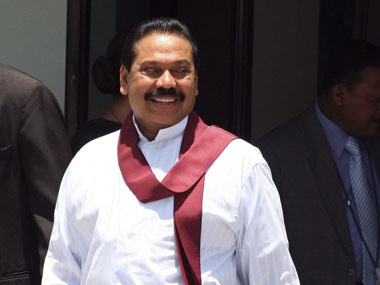India has reasons to grin from ear to ear over the results of the recent Sri Lankan parliamentary elections. The people of Sri Lanka have yet again pronounced their verdict against their former two-time president Mahinda Rajapaksa. For a man like Rajapaksa, who has ruled the island nation a little over nine years between November 2005 and January 2015, conceding defeat twice within a gap of few months must be a torturous reality. Rajapaksa can even be termed as semi-dictator given his authoritarian style of functioning. The downfall of Rajapaksa was very imminent and there were a number of events that paved way for this to happen. He was primarily counting on the Sinhala vote thanks to him claiming credit for eliminating the LTTE and its supremo Vellupillai Prabhakaran in 2009. However, the Sri Lankan voters seem to have picked good governance instead. His latest electoral defeat may as well be the end of his political career and beginning of disaster for his brothers in the form of war crimes trials. Corruption is seen as a major contributing factor for the electorate to reject Rajapaksa. First they did not want him as President and now they do not want him as Prime Minister too. [caption id=“attachment_2402396” align=“alignleft” width=“380” class=" “]  Image courtesy: Reuters[/caption] The kickbacks reportedly involved in the projects funded by China are believed to run into billions of dollars – some peg it at the astronomical figure of about US$ 18 billion. The Rajapaksas have obviously denied this. Corruption in the form of favouritism was also rampant during his regime. Another event that badly embarrassed the Rajapaksa government was the Udayanga Weeratunga episode in which it was alleged that Udayanga was involved in an illegal arms deals with 19 Ukrainian nationals between 2011 and 2012. Incidentally Udayanga is a close relative of Rajapaksa. In the series of allegations of authoritarianism against Rajapaksa, the misuse of air force choppers finds special mention. It is believed that the bill for using helicopters and air force planes by Rajapaksa and his family was a staggering Rs.175,35,000, which was reportedly paid by an Army corporal. From the Indian point of view, the latest verdict is a welcome one, primarily because Rajapaksa was seen leaning towards China and Pakistan. His return would have revived the China-Sri Lanka bonhomie much to the discomfort of India. Even the electorate appears to have realized the demerits of its influence in Sri Lanka as they have witnessed the phenomenal kickbacks involved in Chinese funded projects. The Sirisena-Wickremesinghe combination though is yet to pass the litmus test vis-à-vis friendship with India. It is believed that the current regime will not fail India on the Chinese front as Rajapaksa did by allowing Chinese nuclear submarines to be docked at the Colombo port. While the Sirisena-Wickremesinghe combine have been successful in keeping the Rajpaksas at a distance, they will continue to receive the support of the electorate as they have to deliver on their promises and ensure a good functional parliamentary system, creation of new jobs, economic growth, transparent democracy and restoration of human rights. The pair is believed to have received a pat on their backs from the Tamils for the manner in which they ensured that the Sri Lankan army vacated the ‘occupied’ Tamil lands. Now it is for them to capitalize on the goodwill thus created. However, the golden rule of politics says that Rajapaksa and his political career should not be written off. This caution is justified given the fact that Rajapaksa secured about 42.4 percent of popular vote with the UNP ahead by a small margin of 45.7 percent votes. The backing that Rajapaksa still commands from the hard-line Sinhala nationalists makes him a force to reckon with. The Sirisena-Wickremesinghe combine would commit a big mistake if they allow their current victories to blur their vision vis-à-vis Rajapaksa. India cannot afford to be complacent. New Delhi will have to keep a close watch on Rajapaksa’s next political moves. For Rajapaksa’s part, the most important lesson he ought to have learnt is that howsoever big power China has emerged, it does not make much sense to court the nation at the expense of an immediate and culturally alike neighbour like India.
The Sirisena-Wickramasinghe combination though is yet to pass the litmus test vis-à-vis friendship with India.
Advertisement
End of Article
Written by Rajeev Sharma
Consulting Editor, First Post. Strategic analyst. Political commentator. Twitter handle @Kishkindha. see more


)

)
)
)
)
)
)
)
)



